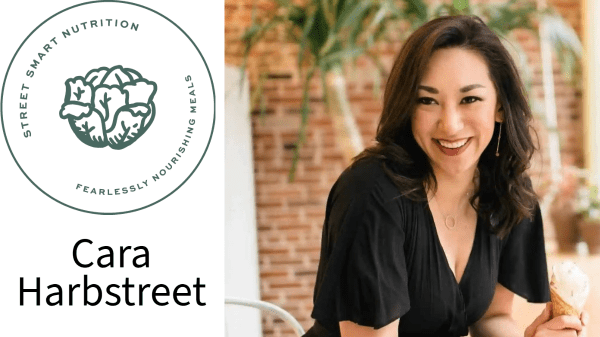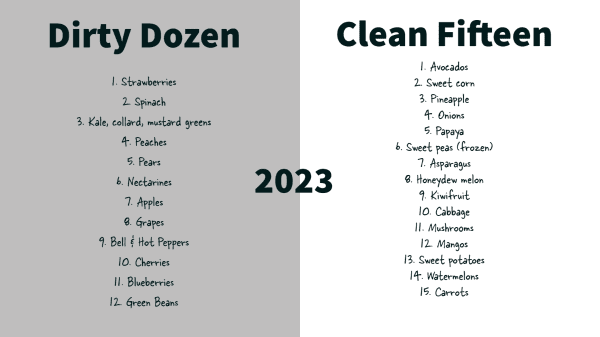How many fruits and vegetables do you eat each day?
If you just sheepishly looked away, you’re not alone.
According to the CDC, only one in ten Americans consume the recommended daily serving of fruits and vegetables. This hasn’t changed much in recent years, with the number of eating occasions for vegetables remaining flat for at least the past 16 years. That number drops off even more for people who are living in or near poverty.
Why then, would we make it even harder for people to access healthy, nutritious foods by adding shame to the equation?

It seems cruel, and yet that’s what happens every day, especially this time of year with the Environmental Working Group’s (EWG) publication of the Dirty Dozen, which highlights the foods that are supposedly most contaminated with pesticides. Blueberries, green beans added to 2023 Environmental Working Group Dirty Dozen list – Produce Blue Book
Maybe those who publish this Dirty Dozen list are well-intentioned, but that doesn’t make this annual event any less harmful. There seems to be more buzz than ever around moralizing foods – declaring some choices to be “good” while others are “bad” – and thus labeling the people who eat these foods as bad. That mentality has consequences.
Peer-reviewed research shows fear-based messaging regarding pesticide residues caused low-income consumers to be less likely to purchase any produce — organic or conventional. To add insult, the EWG follows no scientifically established methodology when developing the annual Dirty Dozen list.
Sensationalized headlines and messaging taken out of context are confusing at best and harmful at worst. In an age of saturated social media misinformation, this undermines efforts to advance health and nutrition literacy and contributes to rising chemophobia.
That’s a high price to pay for information that is, at its core, false. Another peer-reviewed study found that EWG’s suggestion to substitute organic forms of produce for conventional forms did not result in any decrease in risk because residues on conventional produce are so minute, if present at all.
In fact, whether you are buying organic, non-organic, local, or imported, your food has almost certainly been grown with the help of pesticides. This is why the FDA advises consumers to wash produce under running tap water to reduce or even eliminate potential pesticide residues.
Even if we ate all 12 of the produce items on the Dirty Dozen list routinely, our chronic exposure level to pesticides would be less than 0.01 percent of what the Environmental Protection Agency (EPA) considers potentially worrying. It is also important to remember that the pesticide industry is one of the most heavily regulated in the world; a pesticide that poses serious health concerns to any segment of the population would never make it to market.
At the end of the day, what we choose to put into our bodies is extremely personal, and there are many factors that go into deciding what’s right for you and your family. It’s much more than just saying, “This is right” or “This is wrong,” and I’m certainly not here to tell you how to eat. I do want to encourage you to do what works for you. If you’re budget-conscious, there’s no need to feel badly about not being able to afford generally more expensive organic foods.
Whether conventional or organic, the nutrients in fruits and vegetables support our health in many ways. It doesn’t take a nutrition degree to know that these foods are good for us. Why encourage any type of messaging that dissuades people from eating certain types of produce when we’re struggling to eat fruits and veggies anyway?
So, am I telling you not to eat organic? No. I’m telling you to make your own choices, and let others do the same without shaming them. That’s the beauty of personal choice. If you’re making a food choice that you feel good about – without feeling morally superior to someone who makes a different choice – that’s great. My mission as a dietitian is always to provide enough information for my clients and their families to feel empowered and confident in their food choices, and I want the same for you.
If it fits your budget, lets you cook and eat how you prefer, and can easily be found most of the time, it’s probably a sustainable choice for you because it’s a healthful habit you can maintain indefinitely. If that means you opt for organic fruits and veggies, cool. But don’t feel like you must purchase organic simply because of the latest Dirty Dozen list or the label that appears on a food, and please stop looking down your nose at people who opt for conventional produce.
Instead of shaming people for their food choices and tearing them down, what if we built up our community and encouraged them? I’ll start – I support you and believe you are doing the best you can to eat well in your situation. I hope you believe the same about me.



